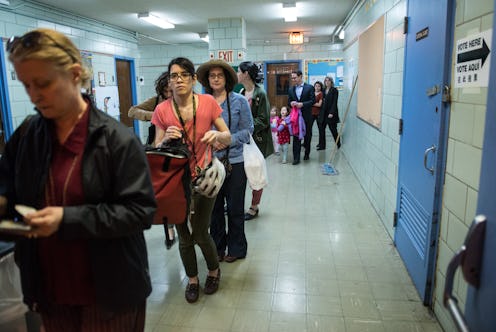News
Be First In Line To Vote In The "First State"
Tuesday could be one of the biggest days in the presidential primary, with elections in five states potentially ending with determined nominations in both the Democrat and Republican contests. For presidential hopefuls Hillary Clinton and Donald Trump, New York's primary seems to have pushed the nomination so close they can almost taste it and Tuesday's frenzy of voting could place them in a position to finally secure the required number of delegates. This Tuesday, they'll be trying to build on the momentum of their New York wins in smaller states like Delaware, where the number of delegates is less but no less important. With so much at stake, it's important for voters to stay informed about their local election process. That means knowing what time Delaware's primary starts.
Delaware makes it easy for voters, be they Democrats or Republicans, by holding primary elections for both parties on the same day, at the same time. This helps to limit confusion as to who votes when, but does nothing to curb uncertainty over who's eligible to vote. (More on that later.) Polls will open for Democrats and Republicans across Delaware at 7 a.m. ET and close promptly at 8 p.m., according to the state's Department of Elections.
At stake in Delaware's Democratic primary are 21 pledged delegates awarded proportionately after a statewide vote and 10 unbound delegates, which include Vice President Joe Biden. Half of the state's superdelegates are reportedly already pledged to Clinton, according to Delaware Online. Following her victory in New York, Clinton will ride into Tuesday's primaries with 1,444 of the 2,026 pledged delegates needed to secure her party's nomination. Sanders trails behind at 1,207 delegates with a much more narrow path to victory before him.
Across the aisle, Republican presidential candidates have the chance to snag 16 delegates from Delaware in a winner-take-all system of allocation. Throughout the primary, Republicans have seen a slightly more competitive contest with an overcrowded early ballot hindering any one candidate from quickly racking up delegates straight out of the gate. With a strong performance in New York — he went home with 89 out of 95 delegates — Trump is now more than two-thirds of the way to the minimum number of delegates needed to secure the nomination. With it mathematically improbable they'll hit the 1,237-threshold themselves, Trump's rivals, Texas Sen. Ted Cruz and Ohio Gov. John Kasich, are hoping to keep him from capturing the 392 delegates he needs in favor of battling it out at a contested convention in July.
Both parties host closed primaries in the state of Delaware, meaning voters registered as Independents won't be able to participate unless they changed their party affiliation prior to by April 2. According to Delaware's Department of Elections, only registered Democrats or Republicans can cast ballots on Tuesday, a fact that might prove to be more of a problem for Democratic candidate Sen. Bernie Sanders than anyone else. The Washington Post found that as much as 40 percent of the Vermont senator's support came from Independent voters in one instance last month.
The state of this year's presidential primaries puts Delaware (and Connecticut, Maryland, Pennsylvania and Rhode Island for that matter) in a significant position to push both parties' races closer to completion. So it's worth it to double check your designated polling location and consider showing up early to ensure your vote gets cast and counted.
